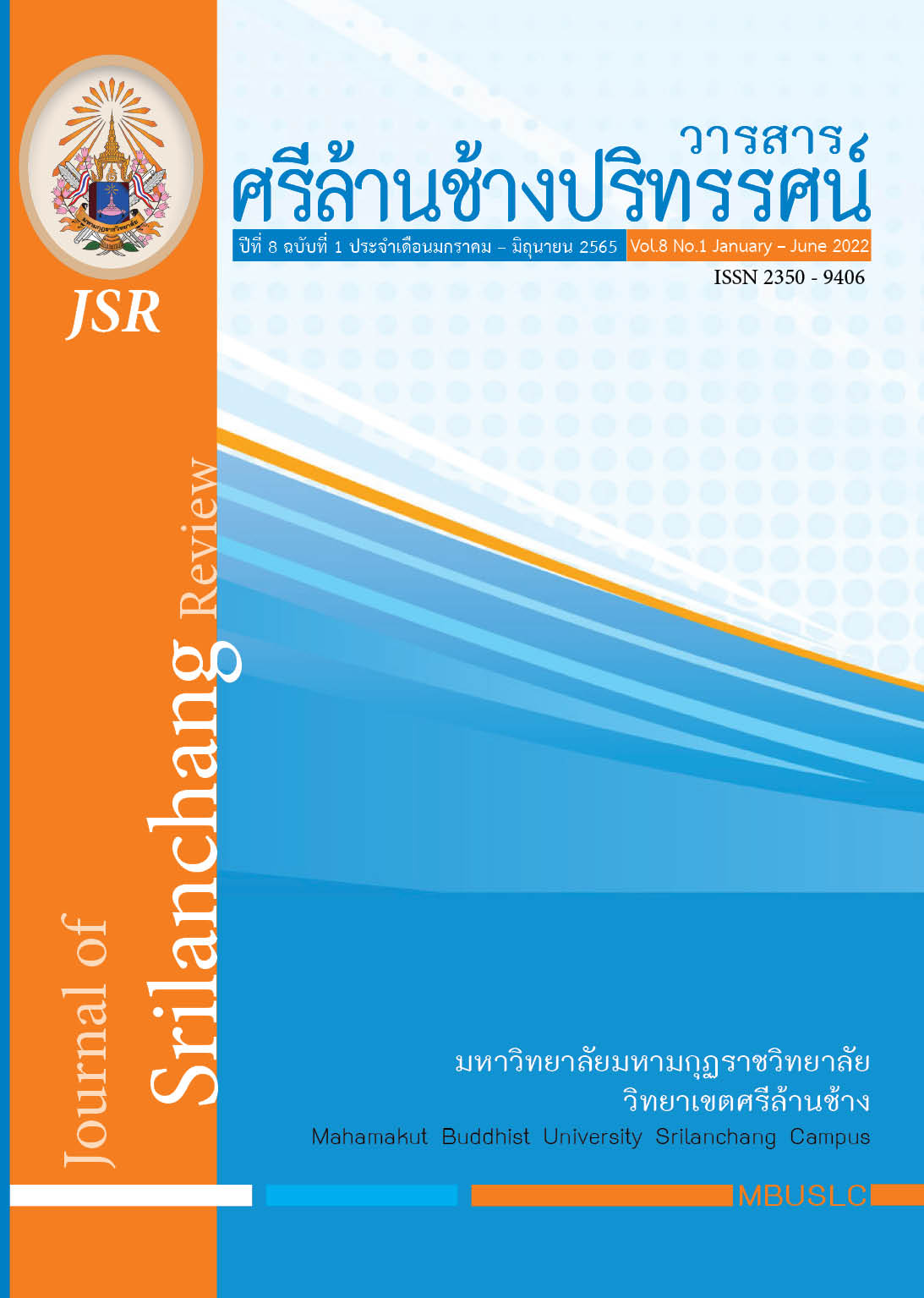ผลการจัดการเรียนรู้โดยใช้ปัญหาเป็นฐานเพื่อศึกษาผลสัมฤทธิ์ทางการเรียน และจิตวิทยาศาสตร์ของนักเรียนชั้นประถมศึกษาปีที่ 5 โรงเรียนอนุบาลลุมพุก (วันครู 2503)
Main Article Content
บทคัดย่อ
งานวิจัยนี้มีวัตถุประสงค์เพื่อ 1) เปรียบเทียบผลสัมฤทธิ์ทางการเรียนของนักเรียนชั้นประถมศึกษาปีที่ 5 ก่อนและหลังเรียน 2) เปรียบเทียบผลสัมฤทธิ์ทางการเรียนของนักเรียนชั้นประถมศึกษาปีที่ 5 หลังเรียนเทียบกับเกณฑ์ร้อยละ 70 และ 3) ศึกษาจิตวิทยาศาสตร์ของนักเรียนหลังจัดการเรียนรู้โดยใช้ปัญหาเป็นฐาน กลุ่มตัวอย่างที่ใช้ในงานวิจัยครั้งนี้ ได้แก่ นักเรียนชั้นประถมศึกษาปีที่ 5 โรงเรียนอนุบาลลุมพุก (วันครู 2503) จังหวัดยโสธร จำนวน 40 คน ที่ได้มาจากการสุ่มแบบกลุ่ม แบบแผนของการวิจัยในครั้งนี้เป็นแบบศึกษากลุ่มเดียววัดสองครั้ง (One group Pretest-Posttest design) เครื่องมือที่ใช้ในการวิจัยประกอบด้วย 1) แผนการจัดการเรียนรู้โดยใช้ปัญหาเป็นฐาน เรื่อง สิ่งมีชีวิต 2) แบบวัดผลสัมฤทธิ์ทางการเรียน มีค่าความเชื่อมั่นของแบบวัดเท่ากับ 0.787 และ 3) แบบวัดจิตวิทยาศาสตร์ซึ่งประเมินโดยตัวนักเรียน มีค่าความเชื่อมั่นของแบบวัดเท่ากับ 0.87 ทำการวิเคราะห์ข้อมูลด้านผลสัมฤทธิ์ทางการเรียน โดยใช้ค่าสถิติทดสอบ t-test โดยทำการเปรียบเทียบก่อนเรียนกับหลังเรียน (Dependent sample) เทียบค่าเฉลี่ยกับเกณฑ์ร้อยละ 70 (One sample) และทำการวิเคราะห์ข้อมูลด้านจิตวิทยาศาสตร์ของนักเรียนโดยใช้ค่าเฉลี่ย
ผลการวิจัย พบว่า
- ผลการเปรียบเทียบผลสัมฤทธิ์ทางการเรียนวิชาวิทยาศาสตร์ของนักเรียนชั้นประถมศึกษาปีที่ 5 เรื่อง สิ่งมีชีวิตก่อนและหลังได้รับการจัดการเรียนรู้โดยใช้ปัญหาเป็นฐาน พบว่านักเรียนมีคะแนนเฉลี่ยหลังเรียนสูงกว่าก่อนเรียนอย่างมีนัยสำคัญที่ระดับ .05
- ผลการปรียบเทียบผลสัมฤทธิ์ทางการเรียนของนักเรียนชั้นประถมศึกษาปีที่ 5 เรื่อง สิ่งมีชีวิต หลังได้รับการจัดการเรียนรู้โดยใช้ปัญหาเป็นฐาน เทียบกับเกณฑ์ร้อยละ 70 พบว่า คะแนนเฉลี่ยของนักเรียนหลังเรียนสูงกว่าเกณฑ์ร้อยละ 70 อย่างมีนัยสำคัญที่ระดับ .05
- ผลการศึกษาจิตวิทยาศาสตร์ของนักเรียนชั้นประถมศึกษาปีที่ 5 เรื่อง สิ่งมีชีวิตที่ได้รับการจัดการเรียนรู้โดยใช้ปัญหาเป็นฐาน พบว่าโดยเฉลี่ยนักเรียนมีจิตวิทยาศาสตร์อยู่ในระดับมากที่สุด
Article Details

อนุญาตภายใต้เงื่อนไข Creative Commons Attribution-NonCommercial-NoDerivatives 4.0 International License.
บทความที่ได้รับการพิจารณาจากคณะกรรมการผู้ทรงคุณวุฒิและเผยแผ่ในวารสารฉบับนี้ เป็นทัศนคติและข้อคิดเห็นส่วนบุคคลของผู้เขียนแต่ละท่าน ไม่ถือว่าเป็นทัศนะคติและความรับผิดชอบ
ของบรรณาธิการ
บทความ ข้อมูล เนื้อหา รูปภาพ ฯลฯ ที่ได้รับการตีพิมพ์ในวารสารศรีล้านช้างปริทรรศน์ ถือเป็นลิขสิทธิ์ของวารสารศรีล้านช้างปริทรรศน์ หากบุคคลหรือหน่วยงานใดต้องการนำทั้งหมดหรือส่วนหนึ่งส่วนใดไปเผยแพร่ต่อหรือเพื่อกระทำการใด ๆ จะต้องได้รับอนุญาตเป็นลายลักอักษรจากวารสารศรีล้านช้างปริทรรศน์ ก่อนเท่านั้น
เอกสารอ้างอิง
AKÇAY, B. (2009). Problem-based learning in Science Education. Journal of TURKISH SCIENCE EDUCATION. 6(1), 26-36.
Anderson, L. W., and Krathwohl, D. R. (2001). A taxonomy for learning, teaching, and assessing: A revision of Bloom’s taxonomy of educational objectives. New York: Addison Wesley Longman.
Brears, L., MacIntyre, B., and O'Sullivan, G. (2011). Preparing teachers for the 21st century using PBL as an integrating in science and technology education. Design and Technology Education, 16(1), 36-46.
Deborah E. A., Richard S. D., Stephen A. B. (2011). Problem-based learning. New Directions for Teaching and Learning. 128. 21-29.
Hung, W., Jonassen, D. H., & Liu, R. (2008). Problem-based learning. Handbook of research on educational communications and technology, 3(1), 485-506.
Walton, H.J., and Matthews, M.B. (1989). Essentials of problem-based learning. Medical Education. 23(6). 542-558.
กมลฉัตร กล่อมอิ่ม. (2560). การจัดการเรียนรู้แบบการใช้ปัญหาเป็นฐาน (Problem Based Learning): รายวิชาการออกแบบและพัฒนาหลักสูตร สำหรับนักศึกษาวิชาชีพครู. วารสารบัณฑิตศึกษา มหาวิทยาลัยราชภัฏวไลยอลงกรณ์ ในพระบรมราชูปถัมภ์. (11)2. 179-192.
กระทรวงศึกษาธิการ. (2551). หลักสูตรแกนกลางการศึกษาขั้นพื้นฐาน พุทธศักราช 2551. กรุงเทพฯ: โรงพิมพ์ชุมนุมสหกรณ์การเกษตรแห่งประเทศไทย.
กระทรวงศึกษาธิการ. (2560). หลักสูตรแกนกลางการศึกษาขั้นพื้นฐานพุทธศักราช 2551 (ฉบับปรับปรุง พ.ศ. 2560). กรุงเทพฯ: สำนักนายกรัฐมนตรี.
พันธ์ ทองชุมนุม. (2547). การสอนวิทยาศาสตร์ระดับประถมศึกษา. กรุงเทพฯ: โอเดียนสโตร์.
พิมพ์เพชร ไปเจอะ. (2563). การพัฒนาผลสัมฤทธิ์ทางการเรียน ความสามารในการแก้ปัญหา และจิตวิทยาศาสตร์ของนักเรียนชั้นมัธยมศึกษาปีที่ 2 ด้วยการจัดการเรียนรู้แบบใช้ปัญหาเป็นฐานร่วมกับเทคนิคเพื่อนคู่คิด. วารสารชุมชนวิจัย มหาวิทยาลัยราชภัฏนครราชสีมา. (15)2. 239-251.
วัฒนา รัตนพรหม. (2548). การเรียนรู้โดยใช้ปัญหาเป็นหลัก. วารสารศึกษาศาสตร์ปริทัศน์. 20(1). 33-40.
วราภรณ์ ไทยมิตร. (2560). การศึกษาผลสัมฤทธิ์ทางการเรียนและการคิดวิเคราะห์ของนักเรียน ชั้นมัธยมศึกษาปีที่ 5 ที่ได้รับการจัดการเรียนรู้โดยใช้ปัญหาเป็นฐาน. วิทยานิพนธ์ ครุศาสตรมหาบัณฑิต, สาขาวิทยาศาสตร์ศึกษา, มหาวิทยาลัยราชภัฏมหาสารคาม.
วิทวัส ดวงภุมเมศ. (2560). การจัดการเรียนรู้ในยุคไทยแลนด์ 4.0 ด้วยการเรียนรู้อย่าง กระตือรือร้น. วารสารมนุษยศาสตร์และสังคมศาสตร์ บัณฑิตวิทยาลัยมหาวิทยาลัย ราชภัฏพิบูลสงคราม, 11(2), 1-14.
วรวิทย์ ตันฑนะเทวินทร์, อาทิตย์ ฉัตรชัยพลรัตน์, กุหลาบ ปุริสาร และ วรากร ตัณฑนะเทวินทร์. (2563). การจัดการเรียนรู้โดยใช้ปัญหาเป็นฐาน (Problem Based Learning). วารสารวิทยาลัยบัณฑิตเอเชีย. (10)2. 29-36.
สถาบันส่งเสริมการสอนวิทยาศาสตร์และเทคโนโลยี. กระทรวงศึกษาธิการ. (2560). คู่มือการใช้หลักสูตรรายวิชาพื้นฐานวิทยาศาสตร์. ออนไลน์. สืบค้นเมื่อ 1 มีนาคม 2565. แหล่งสืบค้น https://www.scimath.org/e-books/8922/flippingbook/index.html #5/z
สำนักวิชาการและมาตรฐานการศึกษา. สำนักงานคณะกรรมการการศึกษาขั้นพื้นฐาน. (2552). ตัวชี้วัดและสาระการเรียนรู้วิทยาศาสตร์ ตามหลักสูตรแกนกลางการศึกษาขั้นพื้นฐาน พุทธศักราช 2551. กรุงเทพมหานคร: โรงพิมพ์ชุมนุมสหกรณ์การเกษตรแห่งประเทศไทย จำกัด.


